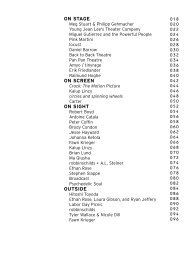BOMB Magazine: Shirin Neshat by Arthur C. Danto
BOMB Magazine: Shirin Neshat by Arthur C. Danto
BOMB Magazine: Shirin Neshat by Arthur C. Danto
You also want an ePaper? Increase the reach of your titles
YUMPU automatically turns print PDFs into web optimized ePapers that Google loves.
the music she performs breaks all the rules of traditional Islamic music. Her music<br />
is free-form, improvised, not tied to language, and unpredictable, almost primal.<br />
<strong>BOMB</strong> <strong>Magazine</strong>: <strong>Shirin</strong> <strong>Neshat</strong> <strong>by</strong> <strong>Arthur</strong> C. <strong>Danto</strong> 5/17/10 1:58 PM<br />
AD When you say she’s not supposed to…<br />
SN An important aspect of Turbulent is that women in Iran are prohibited from<br />
singing in public, and there are no recordings <strong>by</strong> female musicians. The piece took<br />
off in various directions and brought about other important questions about the<br />
male and female contrast in relation to the social structure. The ultimate question<br />
was how each would go about reaching a level of mystical expression inherent in<br />
the Sufi music.<br />
AD But her song is not a traditional song.<br />
SN No. It is Sussan Deihim’s music; she’s a gifted, contemporary Iranian singer<br />
living in New York. Although her music is based on traditional Islamic melodies, it is<br />
quite radical, too, in that it does not quite resemble any particular music.<br />
AD It was her voice in Turbulence, and her person you were photographing?<br />
SN Yes. We spent a lot of time together discussing the choice of music and her<br />
presence in the film and how absolutely critical they were to the meanings of the<br />
work.<br />
AD Very percussive.<br />
SN By the end, we wanted the male singer to be stunned, in a state of disbelief,<br />
and the female singer to be released—freed. She, of course, had no trouble doing<br />
that.<br />
AD Well, she had no trouble with the music. But that effect, of being free, and the<br />
man being stunned—do you think that registers visually in the film?<br />
SN I think it did. We discussed at great length with Shoja, the male singer, how<br />
important his expressions were, his compassionate but almost envious gaze.<br />
AD Who wishes in a way that he could be freer, as she is.<br />
SN Exactly. And that sexual hierarchy is inevitably outside of his control. Perhaps<br />
he himself is a type of prisoner.<br />
AD Very much like the men in Rapture.<br />
SN Rapture followed the same framework. Once again, the women are the<br />
unpredictable force, they are the ones who break free. The men, from the beginning<br />
to the end, stay within the confinement of the fortress. This all ties back to what I<br />
believe is a type of feminism that comes from such a culture; on a daily basis the<br />
resistance you sense from the women is far higher than that of the men. Why?<br />
Because the women are the ones who are under extreme pressure; they are<br />
repressed and therefore they are more likely to resist and ultimately to break free.<br />
AD Formally speaking, it doesn’t sound entirely different from feminist discourse in<br />
the West. The difference as you represent it in the films is that the men seem<br />
condemned to a life of futility, and are unable to break free. Whereas here, the male<br />
life is conceived of as the significant life, overcoming obstacles, having careers,<br />
etcetera. And in a certain way, an American woman’s freedom is modeled on the<br />
idea of what it is to be a free male. Whereas what you convey is women moving into<br />
a very unstructured space, for which males are no longer the models. If anything, if<br />
the male is to genuinely be free, he’d almost have to model himself on the female.<br />
And of course you can’t be terribly explicit about that because nobody knows how<br />
that’s going to work out. One of the things I love about Rapture is the uncertainty of<br />
it. With these women setting off on that boat, you found, I thought, a marvelous,<br />
mythic image.<br />
SN Thank you. But I disagree with you that our idea of feminism is similar to that<br />
of the West. From my understanding, Western feminism is about reaching a certain<br />
level of equality between men and women…<br />
AD Yes, that’s just what I do mean.<br />
SN But I don’t believe we strive for the same thing. Iranian women, for example,<br />
http://bombsite.com/issues/73/articles/2332 feel that men and women have their own distinct roles and places, they are not<br />
competitive.<br />
5 of 10<br />
AD And that will continue to be true?






